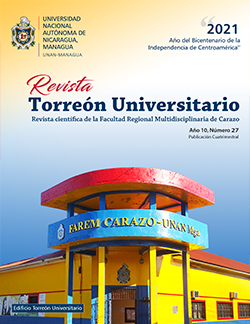Fragmented reading: a strategy learning in digital era
DOI:
https://doi.org/10.5377/torreon.v10i27.10837Keywords:
Reading habit, digital reading, fragmented reading, types of readingAbstract
This research focuses on the reading influence on learning process of students from Educational IT department of UNAN-Managua. This investigation comes from the fact that the students barely read books, whether digital or hard copy. Likewise, it was noticeable that reading is poor in the department students. Therefore, it was decided to carry out the research with the Educational IT department. The population included staff and students around 170 individuals. To do it, it a theoretical frame was built which covers the different types of reading and the reading habits that lead analysis and discussion. The research is descriptive with a qualitative approach, although quantitative instruments are used, a detailed and in-depth analysis is made to make the phenomenon clearer. From the analysis process it was obtained that students make a superficial reading and fragmented as a learning strategy; besides, they do not invest in buying books, they mostly go downloading them from the Internet. In their spare time they prefer to spend time with their friends or sleep instead of reading, even though teachers propose strategies for reading compression and encourage reading, students do fragmented readings, not deep, focused more on the steps, however, they have developed the ability to extract main ideas and build knowledge from different sources, and also have the ability to discriminate information in short periods of time.
Downloads
Downloads
Published
How to Cite
Issue
Section
License
Los autores que publican en esta revista están de acuerdo con los siguientes términos.
- El autor o los autores de los artículos, ensayos o investigaciones conceden a la Universidad Nacional Autónoma de Nicaragua, Managua (UNAN-Managua) los derechos de edición (copyright) del trabajo enviado, por consiguiente la Universidad cuenta con el derecho exclusivo para publicar el artículo durante el periodo completo de los derechos de autor.
- Estos derechos de autor/ autores autorizan a la Revista Torreón Universitario y a la Universidad editar y divulgar/publicar el artículo en dicha Revista, incluyendo reproducción impresa y electrónica, el almacenamiento, recuperación y cualquier otro tipo de publicación, y fuentes de información secundaria como servicios de resúmenes y bases de datos, así mismo la facultan a proteger el artículo contra el uso no autorizado para su difusión por medios impresos o electrónicos (PDF, HTML, EPUB, XML u otros).
Licencia para el uso del contenido
La revista hace uso de la Licencia Creative Commons Atribución-NoComercial-SinDerivar 4.0 Internacional.
Bajo esta declaración:

Este revista está sujeta a una licencia de Creative Commons Reconocimiento-NoComercial-SinObraDerivada 4.0 Internacional. Puede ser copiada, distribuida y transmitida públicamente siempre y cuando se cite al autor y la fuente (Revista Torreón Universitario), no debe modificarse ni utilizarse con ningún fin comercial. La licencia completa se puede consultar en http://creativecommons.org/licenses/by-nc-nd/4.0/.

